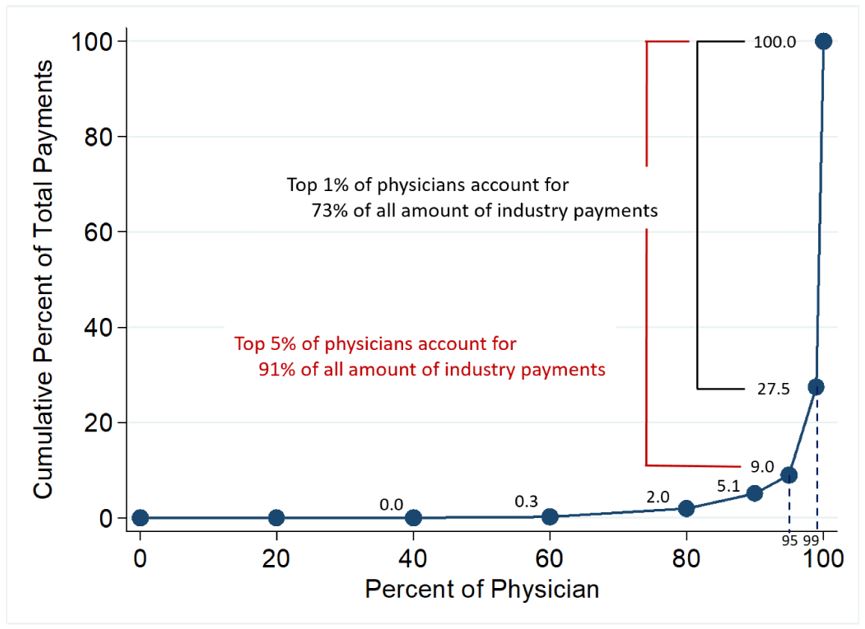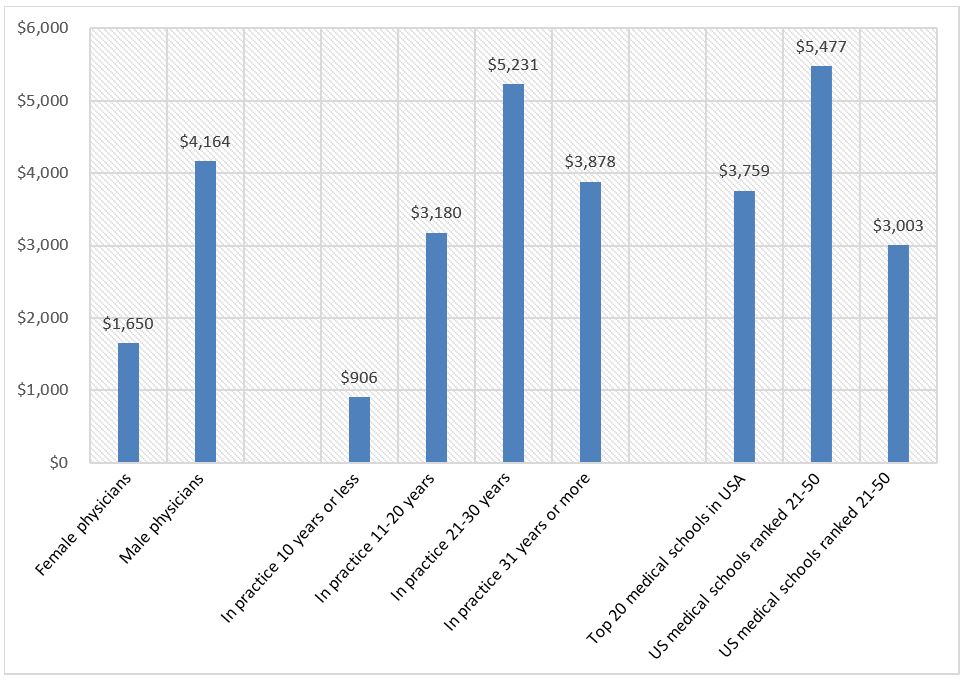[In the Media] Association between physician characteristics and payments from industry in 2015–2017: observational study (BMJ Open, September 23, 2019)
date : 10/17/2019
![[In the Media] Association between physician characteristics and payments from industry in 2015–2017: observational study (BMJ Open, September 23, 2019)](https://hgpi.org/en/wp-content/uploads/sites/2/eyecatch_tsugawa-4.jpg)
U.K. academic journal the BMJ Open publishes research results from a team led by HGPI Board Member Dr. Yusuke Tsugawa.
The U.S. enacted the Physician Payment Sunshine Act in 2010 to increase transparency in the medical industry by making it mandatory for drug and medical device makers to disclose financial relationships with doctors. Since 2012, this data has been available online. A research team at UCLA analyzed payments made to 54 thousand physicians from 2015 to 2017 to identify the characteristics of physicians with strong economic ties to drug makers and similar entities.
Their research revealed that most of the payments made by drug makers and similar entities were concentrated on a small number of physicians. 73% of industry payments went to the top 1% of physicians and 91% of the payments went to the top 5%.

As for the characteristics of the physicians that received the most payments, the team discovered that male physicians, physicians with 21 to 30 years of clinical experience who form the backbone of the medical industry, and physicians who graduated from one of the top fifty medical schools had higher compensation levels. By specialty, higher payments were made to orthopaedic surgeons, neurosurgeons, and endocrinologists.

Please note that the payments referred to above are not limited to monetary payments provided to physicians. A significant portion of the payments were in the form of lunches and drinks at academic meetings, amenities such as stationery, and travel expenses. Please understand that “payments” does not only refer to cash payments like many people might imagine. However, it has been indicated that even general payments can affect what prescriptions physicians write and this is recognized as a problem in the U.S.
Top Research & Recommendations Posts
- [Research Report] Building a Mental Health Program for Children and Measuring its Effectiveness (June 16, 2022)
- [Research Report] 2019 Survey on Healthcare in Japan
- [Policy Recommendations] Developing a National Health and Climate Strategy for Japan (June 26, 2024)
- [Announcement] A Turning Point Towards Building Green Healthcare Systems (June 5, 2024)
- [Research Report] The 2023 Public Opinion Survey on Satisfaction in Healthcare in Japan and Healthcare Applications of Generative AI (January 11, 2024)
- [Policy Recommendations] Obesity Control Promotion Project 2023 “The Next Steps for Engaging and Cooperating with Patients, Citizens, and Communities for Implements of Obesity Control Measurements” (April 8, 2024)
- [Policy Recommendations] Kidney Disease Control Promotion Project 2023 “Establishing Kidney Disease Control Measures with Patient, Citizen, and Community Engagement and Collaboration” Policy Recommendations, a Collection of Good Practices of Chronic Kidney Disease (CKD) and Control Measures in Local Governments (February 14, 2024)
- [New Report] Policy Priorities for Super-Ageing Japan: Health Innovation and Economic Growth in the COVID-19 Pandemic Era (February 24, 2021)
- [Report and Recommendations] Discussion Points in Healthcare DX Project Expert Panel Meeting (April 2, 2024)
- [Policy Recommendations] Achieving Equity in Multidisciplinary Pain Treatment and Support Systems for Pain Management (March 31, 2023)
Featured Posts
-
2024-10-07
[Registration Open] Planetary Health Expert Meeting “Building the Future of Healthcare: A Vision for Sustainable and Resilient Health Systems with GGHH” (November 5, 2024)
![[Registration Open] Planetary Health Expert Meeting “Building the Future of Healthcare: A Vision for Sustainable and Resilient Health Systems with GGHH” (November 5, 2024)](https://hgpi.org/en/wp-content/uploads/sites/2/ph-20241105-topr2.jpg)
-
2024-10-28
[Registration Open] (Hybrid Format) Public Symposium “Promoting CVD Control Based on the Needs of People Living with or Affected by Cardiovascular Diseases: Towards Effective Implementation of the Second Phase CVD Control Plans” (November 22, 2024)
![[Registration Open] (Hybrid Format) Public Symposium “Promoting CVD Control Based on the Needs of People Living with or Affected by Cardiovascular Diseases: Towards Effective Implementation of the Second Phase CVD Control Plans” (November 22, 2024)](https://hgpi.org/en/wp-content/uploads/sites/2/cvd-ncd-20241122-top.png)
-
2024-10-30
[Event Report] Advisory Board Meeting for Meaningful Involvement Promotion Project “Promoting People with Lived Experience Participation in Policy-Making: Building a Social Foundation for Proactive Engagement” (September 11, 2024)
![[Event Report] Advisory Board Meeting for Meaningful Involvement Promotion Project “Promoting People with Lived Experience Participation in Policy-Making: Building a Social Foundation for Proactive Engagement” (September 11, 2024)](https://hgpi.org/en/wp-content/uploads/sites/2/mip_20240911.jpg)
-
2024-10-31
[HGPI Policy Column] (No.49) From the Mental Health Project ”Changes in the Japanese Mental Health Policy and Future Policy Topics” (The 2nd part ”Issues surrounding long-term hospitalization and future policy topics”)
![[HGPI Policy Column] (No.49) From the Mental Health Project ”Changes in the Japanese Mental Health Policy and Future Policy Topics” (The 2nd part ”Issues surrounding long-term hospitalization and future policy topics”)](https://hgpi.org/en/wp-content/uploads/sites/2/column-49-top.png)




